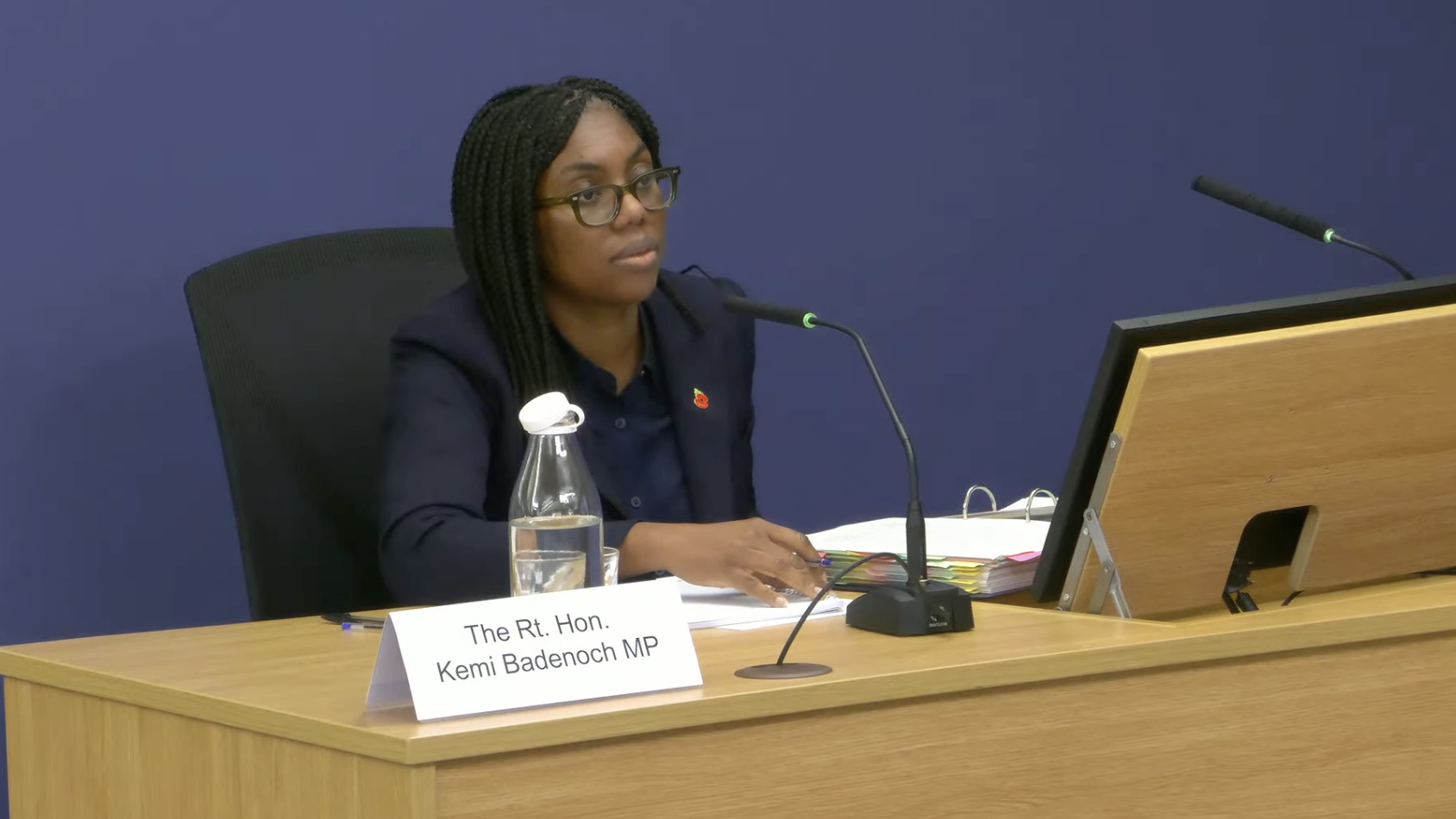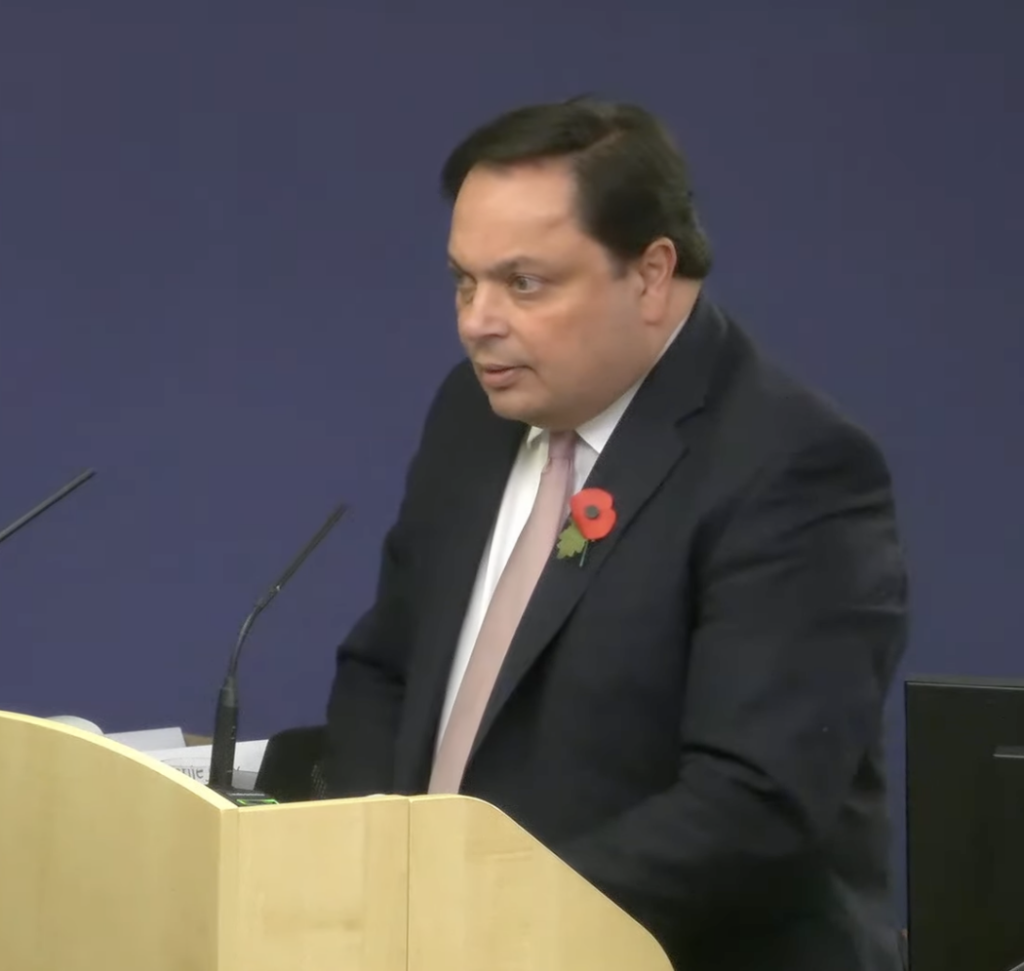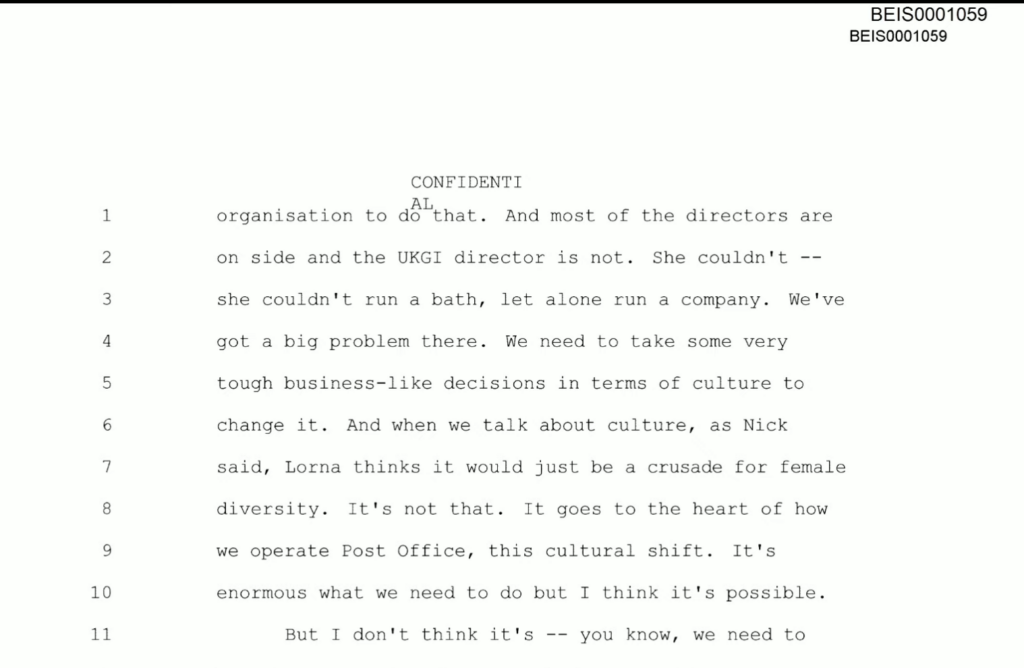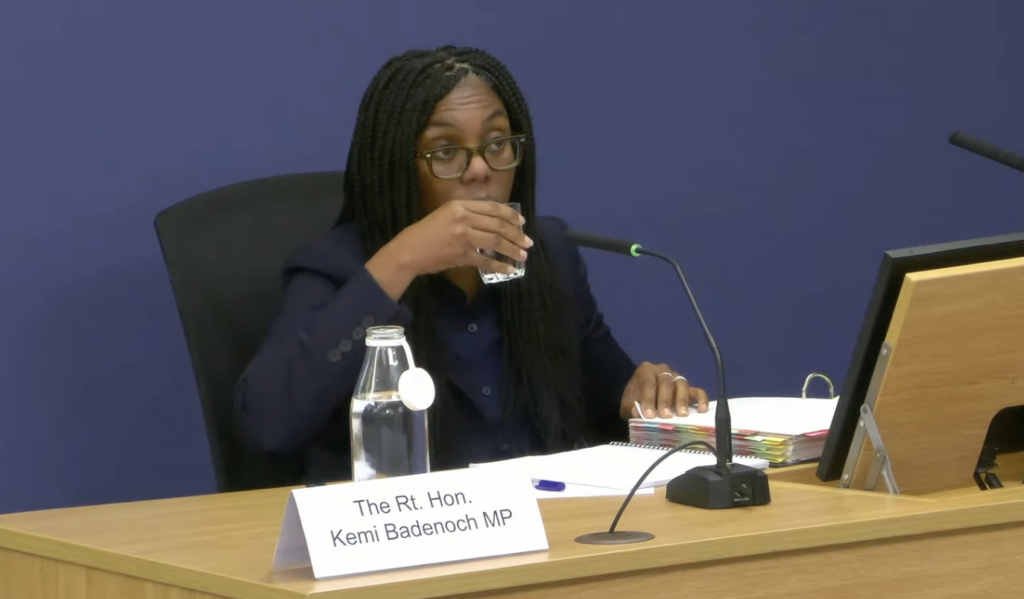
The Kemi Badenoch Show came to the Post Office Horizon IT Inquiry today, along with significant media interest and attendance from a good number of Subpostmasters in the hearing room.
Badenoch, as leader of the Conservative Party, is a potential future Prime Minister. She was, until July this year, the Business Secretary. Badenoch had the advantage of becoming (on 7 Feb 2023) a senior minister with responsibility for the Post Office whilst the public inquiry was already up and running. That meant she knew she would be questioned on oath about every single email and pronouncement she made whilst in office. She also was aware that given the unpopularity of the Conservative administration, there was a very good chance that by the time her decisions might have begun to cause problems, she would no longer be in office.
This was, therefore, the closest thing to a free hit any politician was going to get at this Inquiry, and boy did she use it to her advantage. Quite early on in the exchanges with Jason Beer KC, Badenoch told us how desperate she and her Post Office minister Kevin Hollinrake were to get compensation to Subpostmasters.
“We had briefings on the issue with officials”, she said, “and it was quite clear to me that we were allowing bureaucracy to get in the way of much of the time. Kevin and I wanted to get the money out there, and we were always given a reason why we couldn’t.”
Badenoch says she tried everything to get redress to Subpostmasters quickly, including writing to the Chancellor, Jeremy Hunt, in August 2023, to demand money to fund her ideas for minimum compensation levels for those who were part of the Bates v Post Office group litigation (GLO). Hunt replied that month, telling her:
“As you note, making fixed sum awards on the GLO would incur significant repercussive risk and cost, including to the Horizon Shortfall Scheme. Given the extent of this risk and its high likelihood of crystallisation, I would encourage you to explore the full breadth of other options to advance the ultimate objective of timely and successful delivery of full and fair compensation.”
Beer called this response a “rejection” of her proposal. Badenoch called it “initial resistance”.
Beer took us to an internal email circulated to civil servants at the Business department in which Badenoch’s Private Secretary told colleagues that her boss might provide a Ministerial Direction to give Subpostmasters applying to the GLO scheme a £100,000 flat offer of compensation:
Beer asked: “Can you explain the circumstances in which a Ministerial Direction that may be given?”
The former minister replied: “In government we have to make sure that we’re delivering value for money for the taxpayer and there are some times when an amount that’s being paid is not really value for money but there are other considerations which a minister might think make that worthwhile… The ministerial direction which I had wanted was to overrule the value for money because I was looking at a scenario where if you’re a Subpostmaster would you rather have compensation that might be £10,000 more or £10,000 less than what you would have done versus passing away and your family not getting the money, or you not getting the money. And in my view the worst risk was someone not getting money at all rather than them not getting the exact amount of money right down to the penny.”

Badenoch admitted that a Ministerial Direction could not be made without funding from the Treasury, which at that stage had been refused. “This was also not just me trying to solve the problem,” said Badenoch “but showing willing to my officials so that they didn’t feel that they had to bear the responsibility. A Ministerial Direction is often a short way of saying, don’t worry about it, it’ll be my problem, not yours.”
Beer wondered if this exercise in “soft power” was mere “posturing”.
“It could be seen it could be seen that way”, replied Badenoch, “but I was very happy to to make the Direction, so it wasn’t just posturing but it was signalling the direction which I wanted to take and to make it very clear – and I am happy that we did this because now I can talk about it at the Inquiry – to make it very clear that we need to change the way that we do things in government.”
Quite. I suppose this is what accountability looks like. If everyone making an important decision in government knew it would be publicly and forensically examined less than two years after the event, we might get better decisions. Why can’t people just make better, quicker decisions? Badenoch thinks she knows the answer to that.
“There is an absence of common sense in a lot of Whitehall,” she told Beer, “because people are afraid to trust themselves and trust their judgments, follow principles and do the right thing. People want legal cover. They want to do things in a way that they can show a court or a lawyer that ‘well I followed the rules and I didn’t do anything wrong’, and that might work in a very simple system, but government is now too complex. The problems we’re trying to resolve are far too complex and I don’t think that works anymore. We need to simplify quite a few things.”
It’s worth noting Badenoch gave very little attention to the Post Office scandal before she became Business Secretary. This is something she shares with the current Prime Minister, Keir Starmer, whose engagement on the subject even after he became party leader has been minimal. Badenoch told the Inquiry until her appointment she knew “no more than a lay MP. I was aware that there had been an issue with the Horizon system, and I was also vaguely aware about the outcome of the court case, which was that an injustice had occurred and a lot of postmasters required redress. But the full detail of what had gone wrong with Horizon and what the postmasters had endured, I was not familiar with.”
Sacking Staunton

Badenoch’s self-confidence seemed to wobble when it came to comments she made about officials at UK Government Investments (UKGI) whilst she was sacking the Post Office Chair, Henry Staunton, over the phone. We’ve heard the recording of the conversation at the Inquiry before. On this occasion, Jason Beer relied on the transcript and read it out to the Inquiry. We were taken back to January this year. Having been relieved of his duties, Staunton was (from memory in a rather earnest manner), telling Badenoch what she needed to do in terms of changing the Post Office culture. His first suggestion was to have a third Postmaster NED on the board, secondly start “this journey towards demutualisation”.
Then he referenced the recordings of the former Post Office Communications Director Richard Taylor in which Taylor appeared to insinuate Postmasters who had their convictions quashed were on the take. He used this alongside the letter Post Office CEO Nick Read sent to the Lord Chancellor as an example of the Post Office giving the impression it believed a significant number of now-exonerated Postmasters were “guilty as charged.”
During their call, Staunton told Badenoch: “it’s a mess… it’s got to change and we need a massive cultural shift in this organisation to do that. Most of the directors are onside [but] the UKGI director [Lorna Gratton] is not. She couldn’t run a bath, let alone a company. We’ve got a big problem there. We need to take some very tough business-like decisions in terms of culture to change it…. Lorna thinks it would just be a crusade for a female diversity. It’s not that. It goes to the heart of how we operate.”
Later on in the call, Badenoch says “I’ve noted what you said about UKGI. I do think they have been part of the problem.”
Beer wondered what problem UKGI were part of. Badenoch floundered. “I felt that my own interactions with UKGI were very limited, and I didn’t actually meet Lorna herself until the issues with Henry Staunton had come to light and we were in the process of sacking him… I was giving him the benefit of the doubt with what he had said earlier on in the conversation about issues with UKGI. If you remember, the views I have about Henry Staunton now are different from where I was at the time of this conversation… I took it in good faith that his complaints about UKGI were well meant and true from his perspective. Given everything that’s happened since then, I don’t think that his complaints about UKGI are well-founded.”
“So you were just saying ‘I think UKGI are part of the problem’ as a sop to him?” asked Beer.
“No, not so much as a sop,” replied Badenoch, “but if a Chair feels that way then UKGI should have been aware and should have made me aware as the sole shareholder, not just told Minister Hollinrake.”
Beer allowed Badenoch to finish her evidence on a soapbox. She told the Inquiry about the need for a change in the culture of public law to allow politicians to make decisions properly and take responsibility for their actions.
“If, as a minister, you make a decision,” she said “and every decision is open to challenge on the basis of judicial review, it is quite rational the civil servants will do every single thing they can to make sure that you don’t end up in jail… getting taken to court… all of those things which they do end up slowing down the process. It is just part-and-parcel of creating more accountability, that you add extra processes.”
Warming to her theme, the Tory leader said: “It is a trade-off that is baked in, it is a part of creating accountability… It means that things never happen instantly because you have to create an audit trail, you have to go through the checks and balances, you have to have more meetings, you need to consult, consultations can take months. All of those things slow down the pace. And it’s not about criticising accountability, it is about understanding where the opportunity costs are… the more government does, the bigger government gets, the more it has to do these things. The more requirements there are on the Treasury, the more likely it is that the Treasury is going to be saying no, or creating value for money arguments that mean that it’s salami slicing everything, and everybody’s just getting a little bit of what it needs rather than a big chunk to deliver and perhaps provide transformation.”

Beer waited for Badenoch to finish and said “To summarise that, it’s your view that the rule of law stands in the way of delivery of services by government to the people?”
“No, that’s not what I’m saying.” Badenoch replied. “This is not about the rule of law. This is about the burden of regulation. The burden of regulation is not the rule of law. You can have the rule of law without an excessive burden of regulation. But if you keep adding more and more rules, that will slow down. It doesn’t mean that you don’t want the rule of law, but the rule of law has a purpose and that is to create a fair system in which everybody is treated equally and where everyone can receive justice. If you keep creating more regulations and people aren’t getting justice, then something has gone wrong, and we should be able to look at that without assuming that this is a criticism of the entire system of the rule of law. It means that we should be able to look at how we can reform public law. The law is not above criticism. We should be able to say that actually this isn’t working well, what can we do to improve it? Rather than what is happening now where people say oh, it’s the rule of law, we can’t touch it, let’s not do anything and then there’s more and more injustice. We shouldn’t be afraid to challenge ourselves, we shouldn’t be afraid to challenge the system, we shouldn’t be able to be afraid to challenge government, and we shouldn’t be afraid to challenge the law if we think the law is not delivering for the people.”
Badenoch also made it quite clear that the Post Office should continue to exist as an organisation, which echoed the thoughts of the current Business Secretary, Jonathan Reynolds, who gave evidence before her.
“When the Conservatives were in government,” she told Beer, “we did believe that this is an entity that has not just operational significance, but also a cultural significance that should not be lost. How we maintain that going forwards, given how much it costs, is very difficult. We subsidise this organisation. How do we do so in a way that can keep it going, that can refresh it for the 21st century? It is a labour of love.”
A labour Badenoch seems to believe has virtue. “I think it is a cultural institution that’s absolutely essential for us to keep, and I support it wholeheartedly.”
At the end of his appointed time, Beer had a little dig.
“Ms Badenoch, those are my questions…” he started.
“Thank you!” she replied, quickly.
“… thank you very much for answering some of them,” he finished, leaving her looking a little foolish.
I’m sure she will cope.
The journalism on this blog is crowdfunded. If you would like to join the “secret email” newsletter, please consider making a one-off donation. The money is used to keep the contents of this website free. You will receive irregular, but informative email updates about the Post Office Horizon IT scandal.

Leave a Reply